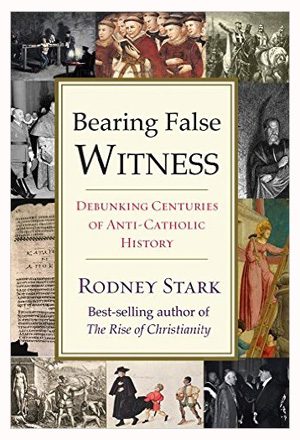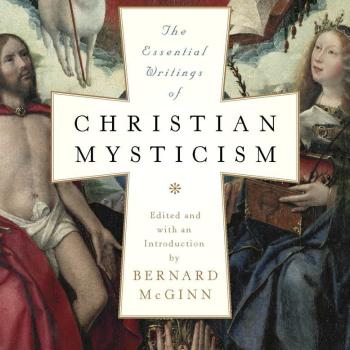
Rodney Stark is a Protestant historian who teaches at a prominent Baptist university. He’s not exactly the kind of academic one might expect to write a book defending Catholicism from the prejudicial myths that have dogged the faith over the past few generations. Yet that is exactly what he has done with Bearing False Witness: Debunking Centuries of Anti-Catholic History. Written for the general public rather than for scholars, it is an engaging and at times eye-opening read, and I think it has some important things to say. But it is a flawed book, and I found reading it almost as frustrating as it was enjoyable.
As someone raised Lutheran and immersed in post-WWII American liberalism, I was familiar with all of the anti-Catholic “dogmas” that Stark deconstructs: allegations that the Church is anti-semitic, hostile to science, vicious in its persecution of heretics and witches, bloodthirsty in its crusades against Islam, and so forth. One by one, Stark considers each of the myths that attack Catholicism, and offers historical evidence that undermines, or at the very least mitigates, the accusations against the Church. He shows how much of the violence blamed on Catholicism should more properly be seen as the responsibility of secular authorities — and how the Church often stood for moderation and restraint (for example, he offers an impressive array of statistics to show that the Spanish Inquisition, far from being the kind of “medieval Gestapo” as it is often portrayed in popular culture, actually tended to be less hostile to Jews, witches and heretics than secular authorities in other parts of Europe, especially Protestant regions).
One of the strengths of this book is that Stark does strive to be balanced and honest, so he is hardly trying to whitewash the sins of the Catholic Church. In a number of chapters the recurring theme of the book seems to be “it wasn’t as bad as it’s made out to be, and/or often the secular or Protestant counterparts to the Church were much worse.” So the anti-Catholic myths, he seems to say, were often exaggerations rather than outright lies. On the other hand, at times the book’s tone seems too breezy and dismissive, especially for a work that is purportedly about setting the record straight on matters of historical record. Again and again, Stark makes comments like these:
Claims that Muslims have been harboring bitter resentments about the Crusades for a millennium are nonsense…
The standard account of the Spanish inquisition is mostly a pack of lies… repeated ever after by the malicious or misled historians eager to sustain “an image of Spain as a nation of fanatical bigots.”
Dismissing anti-Catholic myths as “vicious nonsense” or “a pack of lies” might make for entertaining reading, but it undermines the dignity of his message. Stark seems to see the world in black and white terms: he is not merely trying to correct bad or spurious history, he seems to think that he is on a mission to eradicate evil. Thus, it hardly seems surprising that, when discussing the Crusades, he indulges in the reasoning of a child: “they started it first!” So zealous is Stark to defending the good name of Catholicism that it doesn’t seem to occur to him that, no matter how culpable imperialistic Muslims may have been, the Crusades were still wrong — not because Catholics are bad and Muslims are good, but because the Crusades represent a failure for Christians to live up to our own values.
Stark offers a fascinating way of thinking about Catholicism: he suggests that after Constantine, the Church essentially developed two distinct cultures within it, which he calls “the Church of Power” and “the Church of Piety.” The Church of Power was the mainstream of the hierarchy, bishops and clergy who enjoyed wealth and prestige and who were “worldly in both senses of that term — practical and morally lax.” By contrast, the Church of Piety continued to take Christ’s message seriously, stressing virtue over wealth and influence and seeking reform both of the hearts of individuals and of the Church at large. If the Church of Power belonged to the bishops and clergy, the Church of Piety existed primarily within the cloister (and, later, the mendicant orders).
What bugs me about Bearing False Witness is that Stark seems to regard “the Church of Power” as a perfectly valid expression of Christian faith and practice. This comes especially to light in his final chapter, where he credits the pre-Reformation Church with the creation of capitalist economics. Stark’s own conservatism (or libertarianism, perhaps) makes him regard capitalism with almost reverence (early in the book he dismisses liberation theology as “misguided”), and so in his effort to disprove the myth that capitalism is a characteristic of Protestant society, he charts step by step how medieval Church leaders created such economic innovations as demand-based pricing and distinctions between “usury” and “legitimate interest,” thus setting the stage for the emergence of “moral justifications for the business practices fundamental to capitalism.” Apparently, Stark is perfectly happy with the “Church of Power,” since it gave birth to the economic model he seems to esteem so highly. But whether this might actually represent a betrayal of core Christian values is a question apparently not relevant to his thesis.
So, I have profoundly mixed feelings about this work. What Stark sets out to do, he does, and reasonably well, breezy writing notwithstanding. He challenges the myths of “evil Catholicism” that have had so much currency in the west after the Reformation and especially after the Enlightenment. But reading this as a Catholic (who, admittedly, is firmly in the Church of Piety’s camp), I found that the book left a bitter aftertaste in my mouth. Defending the sins of the Church (or of Catholic civilization) by saying “others did it too” or “it really wasn’t so bad” left me wondering: what, exactly, is Stark trying to defend here? It doesn’t seem to be the message of Jesus. And that is why I remain so frustrated by this book.
Enjoy reading this blog?
Click here to become a patron.














